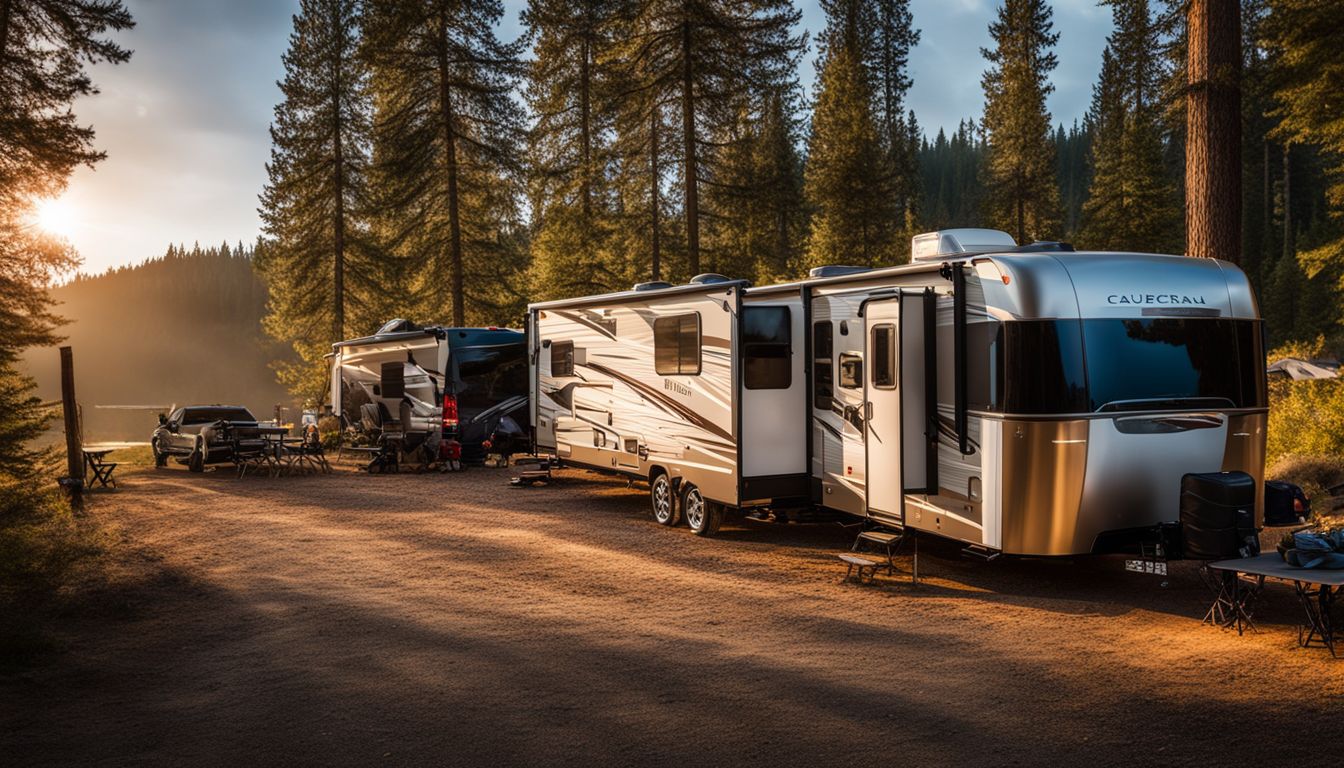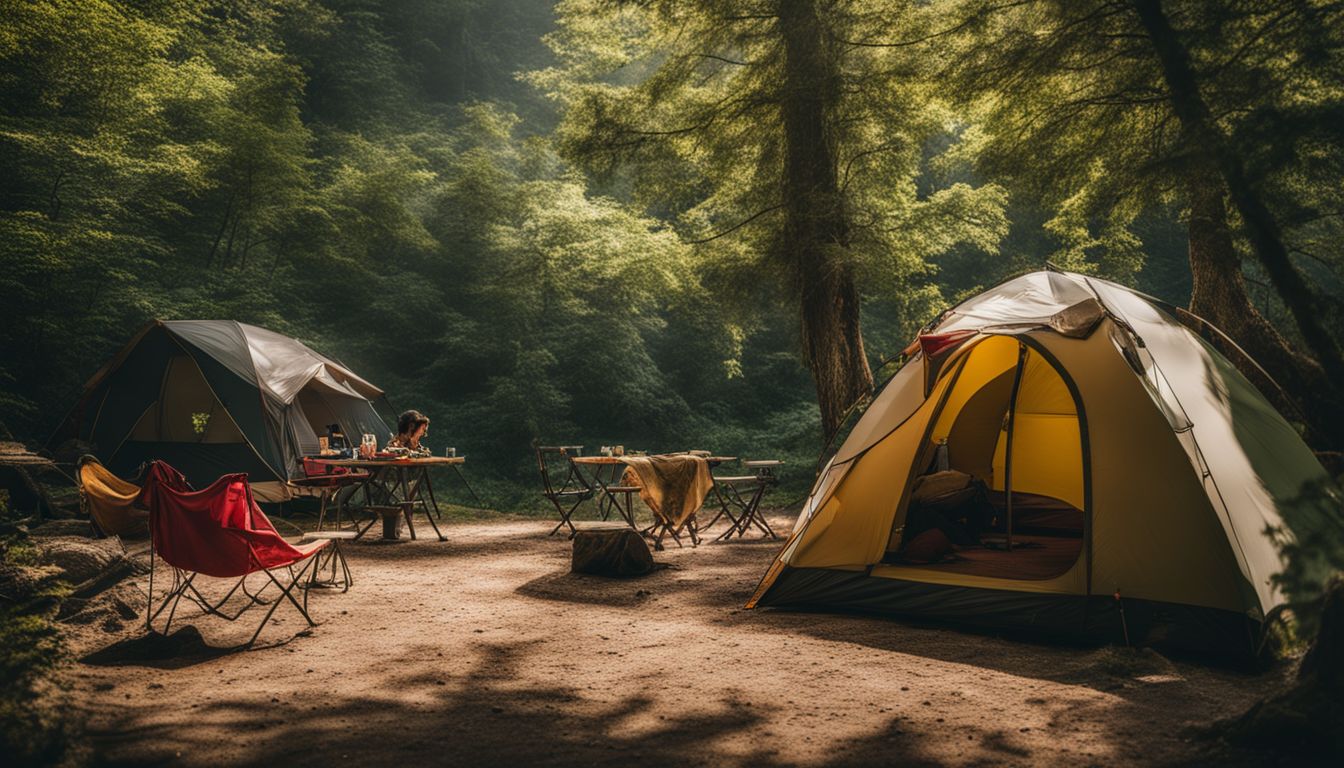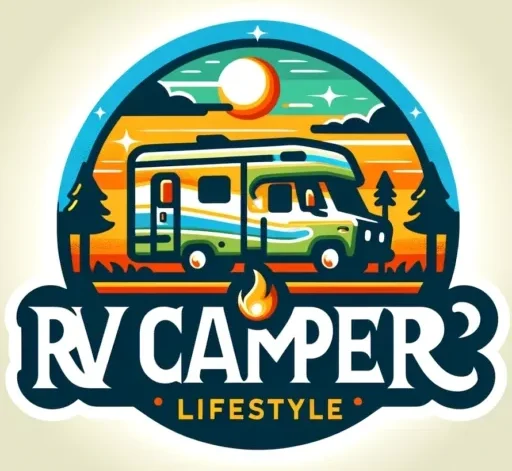Seasonal Campground Etiquette: Essential Tips For A Harmonious Camping Experience
Navigating the world of seasonal camping can sometimes feel like a complex dance, particularly in ensuring our shared spaces stay harmonious. From maintaining cleanliness to respecting boundaries, we’ve distilled their rich knowledge into actionable tips for your serenity out in nature. Dive in – peace awaits!
Key Takeaways
- Cleanliness matters at campgrounds; pack out all trash, keep facilities tidy, and leave no trace.
- Safety is crucial; follow fire safety rules, keep pets secure, and drive slowly within campground limits.
- Silence is golden; minimize noise during quiet hours and be cautious with generator use.
- Personal space is important for a good camping experience; stick to your reserved site and respect boundaries.
- Efficiently using shared spaces like the dump station keeps everyone happy; prepare ahead and clean up after yourself.
Essential Tips for Cleanliness at Campgrounds

Maintaining the pristine nature of your seasonal campsite isn’t just common courtesy—it’s a crucial aspect of outdoor stewardship. Dive into the essentials of cleanliness that every camper should embody, from leaving no trace to handling RV hookups with care, ensuring our camping sites remain welcoming for everyone throughout the seasons.
Keeping the campground tidy
Campgrounds are shared spaces. Everyone appreciates a clean camping site, so let’s do our part in keeping it tidy.
- Pack in and pack out: Bring trash bags and take all your garbage with you when you leave.
- Look for litter: Even if it’s not yours, pick up trash you see lying around.
- Respect the facilities: Use restrooms and showers thoughtfully, leaving them clean for the next person.
- Don’t feed wildlife: Keep food stored away to prevent animals from making a mess around your site.
- Leave no trace: At dispersed camping sites, make sure no one can tell you were there once you’re gone.
Proper use of campground facilities
RV owners know that the heart of a great camping trip is respecting shared spaces. This means using campground facilities wisely and thinking about your fellow campers.
- Keep showers, restrooms, and laundry areas clean. Pick up after yourself and throw away any trash.
- Always let staff know if something is broken or needs attention, like a leaky faucet or a jammed door.
- Wait your turn patiently at showers and sinks, especially during busy times like early mornings or late afternoons.
- Bring shower shoes and a small tote for your toiletries to keep things sanitary and organized for the next person.
- Handle RV hookups with care. Don’t leave hoses or cables out where people might trip on them.
- Share laundry facilities by setting timers on washers and dryers. Remove clothes promptly when they’re done.
- Treat barbecue pits and picnic areas well. Clean up spills, throw away coals safely, and wipe down tables after use.
RV hookups etiquette
Camping with an RV brings comfort to the great outdoors. It’s crucial to be courteous at hookups for a smooth experience.
- Obey all campground rules related to hookups. Each site has guidelines for water, power, and sewer connections.
- Mind your usage of water, electricity, and sewer. Shared resources must last for everyone, so use them wisely.
- Clean up after yourself at the RV hookup spot. Leaving trash or waste disrupts the next camper’s enjoyment.
- Disconnect and move your RV with care. Do this when leaving to prevent damage to the hookup facilities.
- Keep noise levels down around hookup areas. Loud noises can disturb other campers who are close by.
- Respect the space of fellow campers. Avoid spilling hoses or cables into others’ sites.
- Handle shared facilities with consideration. Showers and restrooms are there for all; treat them well.
- Report problems immediately to staff. If something is broken or amiss with hookups, a quick report can help fix it fast.
Safety Measures at Campgrounds

Navigating the great outdoors comes with its set of risks, making safety protocols non-negotiable for any seasonal camper. From ensuring flames are never a hazard to enforcing strict guidelines that keep our furry friends out of harm’s way, we’ll delve into practices that paramountly protect both campers and the precious wilderness around them.
Fire safety rules
Campfires bring warmth and fun to any seasonal campground adventure. But, fire safety is key to protecting everyone around you.
- Follow the campground’s posted rules about campfires. Each place has its own guidelines, like where and when you can light a fire.
- Use designated fire pits or rings to build your campfire. Never start a fire outside of these safe spots.
- Keep water or a shovel nearby in case you need to put out the fire quickly. Being prepared helps stop fires from spreading.
- Cut down on smoke and sparks by burning only dry, local wood. Wet or green wood can be smoky and cause more sparks.
- Watch the weather reports for wind conditions and warnings. On windy days, it’s safer not to have a campfire at all.
- Put out your campfire completely before leaving it unattended. The coals should be cold to the touch to make sure it’s out.
- Teach kids and pets to stay clear of the campfire area. Setting boundaries keeps them safe from burns or accidents.
- Never leave trash or food scraps in the fire pit. Clean up after your campfire so the next camper finds a tidy spot.
Pet safety guidelines
Your furry friends need special care while you’re enjoying the great outdoors in your RV. Follow these pet safety guidelines to make sure they stay happy and healthy at the campground.
- Keep your pets on a leash: This stops them from running off and protects wildlife.
- Always clean up after your pet: Bring bags and dispose of waste properly to keep the area clean for everyone.
- Provide plenty of water: Staying hydrated is important, especially during summer camping.
- Never leave pets alone in an RV: Cars and RVs can heat up fast, putting your pet at risk.
- Be mindful of the weather: Protect paws from hot pavement and have a plan for keeping pets warm during winter camping.
- Update their ID tags: Make sure contact information is current in case they get lost.
- Watch for signs of kennel cough and other illnesses: This prevents diseases from spreading to other animals at the campground.
- Secure food items: Doing so avoids attracting wildlife to your site, which could endanger your pet.
- Create a safe space inside your RV: A familiar spot can reduce anxiety in new environments.
- Know where the nearest vet is: In case of emergency, it’s vital to know how to get help quickly.
Driving rules within campgrounds
Driving safely in campgrounds is just as important as on the highway. RV owners need to follow specific rules to ensure everyone stays safe.
- Drive slowly. Campgrounds are full of people walking and kids playing, so keep your speed under the posted limit, usually 5-10 mph.
- Watch for signs. Follow all posted rules about one-way roads and no-drive zones within the campground.
- Use headlights at dusk. As it gets dark, turn on your lights to make sure you’re visible to pedestrians and other campers.
- Stick to designated paths. Keep your vehicle on roads and designated parking spots to protect the natural surroundings.
- Yield to pedestrians. Give people on foot the right of way; they may not always see or hear your RV coming.
- Avoid honking unnecessarily. The sound can disturb others’ peace and quiet, so only use your horn when absolutely needed.
- Back up with care. Have someone guide you from outside when reversing into a site to prevent accidents.
- Park in your allotted space only. Make sure not to encroach on others’ campsites or common areas with your RV.
- Limit idling time. Turn off your engine promptly after arriving at your spot to reduce noise and air pollution.
Controlling Noise at Campgrounds
Embracing the serenity of nature and fostering a peaceful environment, mastering campground noise etiquette not only enhances your experience but ensures a tranquil stay for all—discover the unwritten rules that make all the difference.
Minimizing campground noise
Campgrounds offer a chance to relax and connect with nature. Keeping the peace means being mindful of the noise we make.
- Hold the volume down on music and TV. Others may not share your taste or appreciate loud sounds.
- Chat quietly, especially during quiet hours. Most campgrounds set times when everyone should keep noise to a minimum.
- Keep your pets in check so they don’t bark too much. Train your furry friends to be calm and quiet neighbors.
- Use headphones if you like to watch movies or listen to music late at night. This helps prevent disturbing others who may be trying to sleep.
- Close car doors gently instead of slamming them. This can create loud bangs that echo throughout the campground.
- Avoid using generators unless absolutely necessary, and never at night or early morning. If you must use one, choose a quiet model that won’t disrupt the calm.
- Laugh and play softly when enjoying games or group activities outside. Fun doesn’t need to be noisy!
Guidelines for pet noise
Pets are a joy on camping trips, but their noise can be a concern. Keep the peace at campgrounds with these pet noise guidelines:
- Observe quiet hours: Just like people, pets need to follow campground quiet hours. Avoid letting your pets make loud noises early in the morning or late at night.
- Use a leash: Keep your pet on a leash to prevent them from running up to other campsites and barking at strangers or other animals.
- Bring familiar items: Pack your pet’s favorite toys or blanket to help them feel secure and calm in the new environment, reducing anxiety-related barking.
- Exercise your pets: A tired pet is a quiet pet. Ensure they get plenty of exercise during the day so they’re more relaxed come evening time.
- Respond quickly: If your pet starts making noise, address it immediately to avoid prolonged disturbances to fellow campers.
- Consider training: Before heading out RVing, invest time in training your pet to respond to quiet commands or to bark only when necessary.
- Be realistic: Some pets naturally make more noise than others. Think about whether your pet is suited for staying at crowded campgrounds.
Etiquette for late arrivals
Arriving late at a campground can be tricky. Always consider the people and nature around you.
- Keep noise to a minimum; roll into your spot quietly, avoid loud talking, and use dim lights to set up camp.
- Follow fire safety rules by not starting a bonfire if it’s too late or against campground regulations.
- Say hello to neighbors in the morning instead of disturbing their peace when you arrive.
- Use the showers, restrooms, and other facilities gently so you don’t wake others.
- Hook up your RV carefully without causing a racket that might bother sleeping campers.
- Clean up after your furry friends right away; never let pet waste become someone else’s problem in the morning.
- Stick to designated paths and spaces to avoid harming plants or wildlife as you get settled.
- Always keep Leave No Trace principles in mind; don’t leave trash or belongings out overnight.
- Respect reserved sites by verifying you’re setting up in the correct location before it gets too dark.
Respecting Social Boundaries at Campgrounds
5. Respecting Social Boundaries at Campgrounds: Navigating the unspoken rules of campground camaraderie can be as tricky as a backwoods trail; it’s all about personal space, proper site usage, and picking up on those subtle social signals—even when you’re queued up at the communal dump station.
Respecting personal space
Respecting personal space is key to a good experience at campgrounds. It creates a comfortable environment for everyone.
- Leave a reasonable gap between your RV and the next one. This gives everyone room to move around and enjoy their own area.
- Avoid cutting through someone else’s campsite. Always walk around, even if it takes a little longer.
- Keep your belongings within your assigned spot. This includes chairs, grills, and toys.
- Respect site boundaries marked on the ground or by signs. Stay within these lines to ensure privacy for all.
- Use quiet voices near other campsites, especially early in the morning and late at night. Loud talks can easily invade others’ spaces.
- Introduce yourself to neighbors with a friendly wave or hello. Keeping a good distance doesn’t mean you can’t be social.
- If you have guests over, remind them of these rules too. They should also understand the importance of personal space at the campground.
Adherence to reserved sites
Sticking to your reserved site is key to a peaceful camping trip. It helps everyone enjoy their own space and avoids conflicts with neighbors.
- Always check in at the campground office upon arrival. They will confirm your reservation and direct you to your site.
- Look for the site number that matches your booking. This is where you’ll set up camp, not anywhere else.
- Keep all your gear within the boundaries of your site. Tents, chairs, and RVs should not spill over into other areas.
- If there’s an issue with your reserved site, report it quickly. The staff can help fix broken equipment or address other problems.
- Respect signs that tag sites as taken. These are someone else’s temporary home away from home.
- Do not move to a different site without permission. Even if another spot looks empty, someone else might have booked it.
- Be ready to show proof of reservation if needed. A printout or digital confirmation works well.
- Leave the site clean when you depart. Trash or belongings left behind can cause trouble for the next camper.
Social cues to remember at the dump station
At the dump station, being quick and efficient keeps everyone happy. Here are some social cues to follow:
- Wait your turn patiently. Let the person ahead of you finish before moving in.
- Prepare before it’s your turn. Have your hoses and gloves ready to avoid delays.
- Keep it clean for the next person. Double – check that you haven’t left any mess behind.
- Respect quiet times. If the campground has set hours, stick to them and don’t make noise during quiet periods.
- Offer a quick hand if someone seems to be struggling, but don’t linger or crowd them.
- Monitor your conversation volume. People are often nearby in their RVs or vacation rentals.
- Be mindful of odors. Use chemicals from REI Co-op or similar shops to reduce smells from your waste tanks.
- Follow posted rules at all times. Campgrounds might have specific instructions for using the dump station.
Conclusion
Remember to always be kind and considerate at campgrounds. Your actions make a big difference in everyone’s outdoor fun. Keep your spot clean, follow the rules, and enjoy nature responsibly.
Let’s all do our part for peaceful camping trips. Happy camping!
FAQs
1. What are some seasonal campground etiquette tips for car camping?
When you’re car camping, always keep the noise down after dark, clean up your site before you leave, and respect your neighbors’ space so everyone can enjoy their time outdoors.
2. How can I stay informed about campground rules throughout the season?
Check your inbox regularly for emails from the campground or loyalty program updates, which often include important rule changes and tips to help make your stay better.
3. Should I book my campsite ahead of time when planning seasonal camping trips?
Absolutely – by booking early through motels or campground websites, you’ll secure your spot and avoid last-minute rushes during busy seasons.







